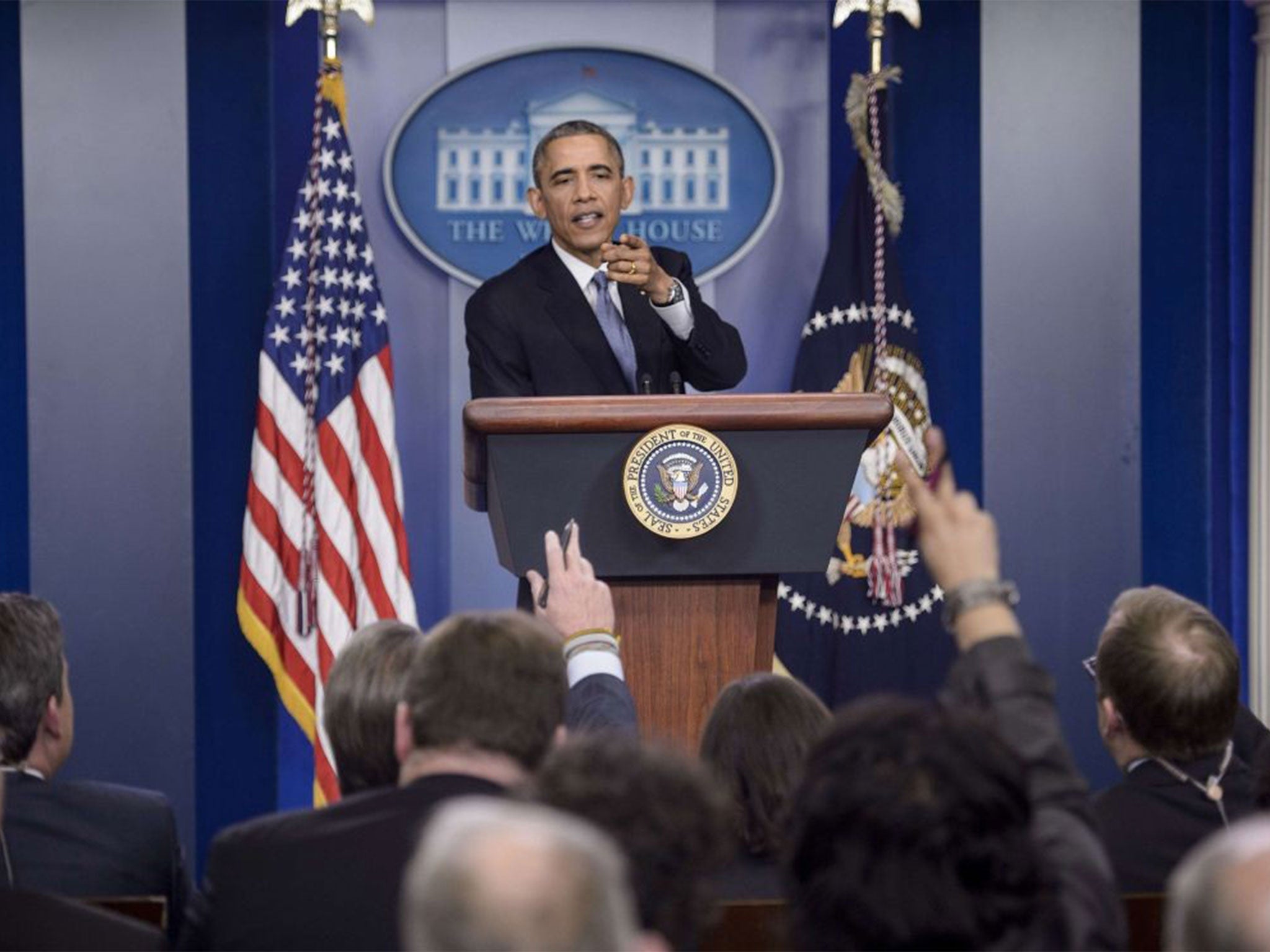Sony hack: North Korea threatens strike against White House after accusing Barack Obama of spreading rumours of cyber-attack
The US blames North Korea for the cyber-attack that caused Sony to cancel The Interview's release

North Korea has threatened strikes against the White House, Pentagon and “the whole US mainland, that cesspool of terrorism”, accusing Barack Obama of “recklessly” spreading rumours of a Pyongyang-orchestrated cyber-attack on Sony Pictures.
Such rhetoric is routine from North Korea's massive propaganda machine during times of high tension with Washington.
But the long statement from the powerful National Defence Commission also underscores Pyongyang's sensitivity at a movie whose plot focuses on the assassination of its leader Kim Jong Un, the beneficiary of a decades-long cult of personality built around his family dynasty.
The US blames North Korea for the cyber-attack that escalated to threats of terror strikes against American cinemas and caused Sony to cancel The Interview's release.
President Obama, who promised to respond “proportionately” to the attack, told CNN's State of the Union that Washington as reviewing whether to put North Korea back on its list of state sponsors of terrorism.
The National Defence Commission, led by Kim, warned that its 1.2 million-member army was ready to use all types of warfare against the US.
“Our toughest counter-action will be boldly taken against the White House, the Pentagon and the whole US mainland, the cesspool of terrorism, by far surpassing the 'symmetric counter-action' declared by Obama,” said the commission's policy department, in a statement carried by the official Korean Central News Agency.
North Korea has said it knows how to prove it had nothing to do with the hacking and proposed a joint investigation with the US.
North Korea and the US, which fought each other in the 1950-53 Korean War, remain technically in a state of war because the conflict ended with an armistice, not a peace treaty. The US stations about 28,500 troops in South Korea to deter aggression from the North.
The rivals are locked in an international stand-off over the North's nuclear and missile programmes and its alleged human rights abuses. Last spring tension dramatically rose after North Korea issued a string of fiery threats to launch nuclear strikes against Washington and Seoul.
Sony Pictures Entertainment, which said it cancelled the cinema release of The Interview after distributors refused to show it, pledged to find a way to get the film out.
“How it's going to be distributed, I don't think anybody knows quite yet,” a Sony lawyer said.
Mr Obama said of North Korea: “We're not going to be intimidated by some cyber-hackers.” The president said the US would examine the facts to determine whether North Korea should go back on the terrorism sponsors list.
“We're going to review those through a process that's already in place,” he said. “I'll wait to review what the findings are.”

But while raising the possibility of a terrorism designation, the president also asserted: “I don't think it was an act of war. I think it was an act of cyber-vandalism that was very costly, very expensive. We take it very seriously.”
That description drew immediate scorn from two Republicans and long-time critics of Mr Obama's foreign policy.
“It is a new form of warfare and we have to counter with that form of warfare with a better form of warfare,” said Arizona senator John McCain.
Senator Lindsey Graham of South Carolina called it “an act of terrorism” and favoured reimposing sanctions and adding North Korea to the terrorism list. The US needed to “make is so hard on the North Koreans that they don't want to do this in the future”, he said.
North Korea spent two decades on the list until the Bush administration removed it in 2008 during nuclear negotiations. Only Iran, Sudan, Syria and Cuba remain on the list, which triggers sanctions that limit US aid, defence exports and some financial transactions.
But adding North Korea back could be difficult. To meet the criteria, the State Department must determine that a country has repeatedly supported acts of international terrorism, a definition that has traditionally referred to violent, physical attacks rather than hacking.
The US is asking China for help as it considers how to respond to the hack. A senior Obama administration official says America and China have shared information about the attack and Washington has asked for Beijing's co-operation.
China wields considerable leverage over North Korea, but Mr Obama has also accused the country of carrying out cyber-thefts.
In the CNN interview, recorded in Washington before Mr Obama left for his holiday in Hawaii, he renewed his criticism of Sony's decision to shelve The Interview.
He suggested he might have been able to help address the problem if given the chance. “You know, had they talked to me directly about this decision, I might have called the movie theatre chains and distributors and asked them what that story was,” he said.
Sony's chief executive has disputed that the company never reached out, saying he spoke to a senior White House adviser about the situation before the company announced the decision. White House officials said Sony did discuss cyber-security with the government, but the White House was never consulted on the decision not to distribute the film.
“Sometimes this is a matter of setting a tone and being very clear that we're not going to be intimidated by some, you know, cyber-hackers,” Mr Obama said. “And I expect all of us to remember that and operate on that basis going forward.”
PA
Join our commenting forum
Join thought-provoking conversations, follow other Independent readers and see their replies
Comments